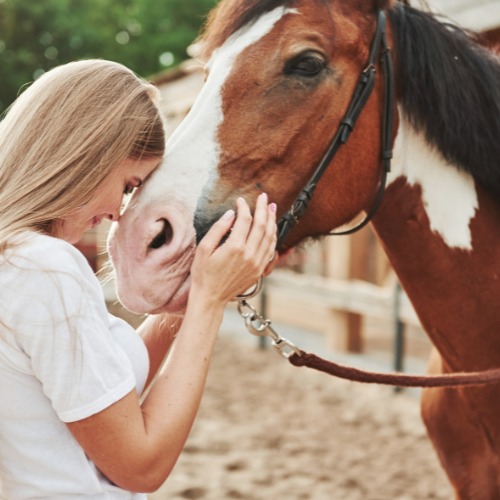Disclosure:
Thank you for reading this post, don't forget to subscribe!
Some of the links on this website are affiliate links. This means that if you click on the link and make a purchase, we may receive a small commission at no extra cost to you. Your support helps us keep the site running.Learn more on my Privacy Policy and Affiliate Disclosure page. Thank you for your support!
Equine therapy, also known as equine-assisted therapy or horse therapy is one of those unique methods focusing not just on the physical but also the emotional and mental well-being of individuals. It has gained recognition as a powerful tool for managing various physical, emotional, and psychological conditions. This innovative form of therapy involves interactions between individuals and horses, providing a unique environment for healing and personal growth. In this article, we will explore the top six conditions that equine therapy can help manage, offering insights into how this approach can benefit individuals of all ages.
1. Anxiety and Stress Management

Understanding Anxiety
Anxiety disorders are among the most common mental health issues, affecting millions of people worldwide. Symptoms can range from excessive worry and restlessness to physical manifestations such as increased heart rate and muscle tension. Traditional therapies often include cognitive-behavioral therapy (CBT) and medication, but many individuals seek alternative methods to manage their anxiety.
How Equine Therapy Helps
Equine therapy provides a calming and non-judgmental environment where individuals can learn to manage their anxiety. Interacting with horses encourages mindfulness, as individuals must focus on the present moment to build a connection with the animal. The rhythmic movement of the horse can also have a soothing effect, helping to reduce stress levels.
Practical Takeaway
Consider incorporating equine therapy into your anxiety management plan. Look for local programs that offer sessions with trained therapists and certified horses. Engaging in this form of therapy can provide valuable coping strategies and emotional support.
The Unexpected Benefits Of Horse Riding: Meditation And Stress Reduction
Horse riding. It conjures images of galloping across fields, jumping over fences,…
Mind-Body Connection: How Meditation And Mindfulness Are Becoming Part Of Fitness Routines
The mind-body connection isn’t just a buzzword; it’s the real deal in…
2. Post-Traumatic Stress Disorder (PTSD)

Understanding PTSD
PTSD is a mental health condition triggered by experiencing or witnessing a traumatic event. Symptoms can include flashbacks, nightmares, severe anxiety, and uncontrollable thoughts about the event. Traditional treatments often involve therapy and medication, but many individuals find it challenging to engage in conventional therapeutic settings.
How Equine Therapy Helps
Equine therapy offers a unique approach to managing PTSD. The presence of horses can create a safe space for individuals to process their trauma. Horses are highly intuitive animals, often mirroring the emotions of their handlers. This connection can help individuals recognize and address their feelings in a supportive environment.
Practical Takeaway
If you or someone you know is struggling with PTSD, consider exploring equine therapy as a complementary treatment option. Many organizations specialize in providing therapy for veterans and trauma survivors, creating a supportive community for healing.
3. Autism Spectrum Disorder (ASD)

Understanding Autism
Autism Spectrum Disorder (ASD) is a developmental disorder that affects communication, behavior, and social interaction. Individuals with ASD may struggle with social cues and often prefer routine and predictability. Traditional therapies, such as speech and occupational therapy, can be beneficial, but many families seek additional support.
How Equine Therapy Helps
Equine therapy can be particularly effective for individuals with ASD. The non-verbal communication required when working with horses can help improve social skills and emotional regulation. Additionally, the sensory experience of being around horses can provide calming effects, reducing anxiety and promoting focus.
Practical Takeaway
Families with children on the autism spectrum should consider equine therapy as a valuable addition to their treatment plan. Look for programs that specialize in working with individuals with ASD to ensure a tailored approach.
4. Depression
Understanding Depression
Depression is a common mental health disorder characterized by persistent feelings of sadness, hopelessness, and a lack of interest in activities. Traditional treatments often include therapy and medication, but many individuals seek alternative methods to complement their treatment.
How Equine Therapy Helps
Equine therapy can provide a sense of purpose and connection for individuals struggling with depression. The responsibility of caring for a horse can foster a sense of accomplishment and improve self-esteem. Additionally, the bond formed with the horse can offer emotional support and companionship.
Practical Takeaway
If you are experiencing symptoms of depression, consider reaching out to an equine therapy program. Engaging with horses can provide a unique perspective on your feelings and help you develop coping strategies.
5. Physical Disabilities

Understanding Physical Disabilities
Physical disabilities can result from various conditions, including injuries, congenital disorders, and chronic illnesses. These disabilities can impact mobility, coordination, and overall quality of life. Traditional therapies often focus on physical rehabilitation, but many individuals seek additional support.
How Equine Therapy Helps
Equine therapy can be an effective form of physical rehabilitation. Riding and caring for horses can improve balance, coordination, and strength. The movement of the horse can also provide therapeutic benefits, helping to enhance muscle tone and flexibility.
Practical Takeaway
Individuals with physical disabilities should consider incorporating equine therapy into their rehabilitation plan. Many programs are designed to accommodate various needs, providing a supportive environment for growth and healing.
6. Addiction Recovery

Understanding Addiction
Addiction is a complex condition characterized by compulsive substance use despite harmful consequences. Recovery often involves a combination of therapy, support groups, and lifestyle changes. Many individuals seek alternative therapies to complement their recovery journey.
How Equine Therapy Helps
Equine therapy can play a significant role in addiction recovery. The bond formed with horses can provide emotional support and accountability. Additionally, the focus required when working with horses can help individuals develop coping strategies and improve their emotional regulation.
Practical Takeaway
If you or someone you know is in recovery from addiction, consider exploring equine therapy as a complementary treatment option. Many programs offer support for individuals in recovery, creating a safe space for healing and growth.
explore more:
Conclusion
Real-life stories often capture the essence of what equine therapy offers. Take, for example, a teenager grappling with anxiety who finds solace in the rhythmic breathing of a horse, or an adult overcoming PTSD through the calming practice of grooming. These experiences underscore the technology-free, human-animal connection that fosters genuine healing. Such narratives highlight the tailored care provided in each session, proving time and again that equine therapy can touch lives in unparalleled ways.
Equine therapy is a powerful tool for managing various conditions, including anxiety, PTSD, autism, depression, physical disabilities, and addiction. By fostering connections with horses, individuals can experience emotional healing, personal growth, and improved well-being. If you are interested in exploring equine therapy, consider reaching out to local programs that specialize in this unique approach.
For more information on mental health and wellness, check out our related articles on mindfulness techniques and alternative therapies.
Additionally, for further reading on the benefits of equine therapy, visit the Equine Assisted Growth and Learning Association.
Now that you understand the potential benefits of equine therapy, consider how it might fit into your or a loved one’s wellness journey. Share this article with others who may benefit from this information, and explore related topics on our website to continue your learning. Together, we can promote awareness and understanding of alternative therapies that can enhance mental health and well-being.
more about
HEALTH / WELLNESS / FITNESS / NUTRITION
Share this article














